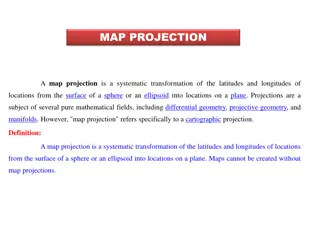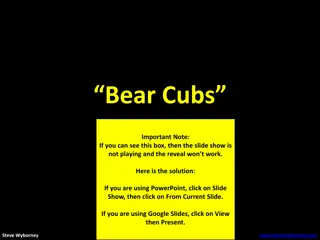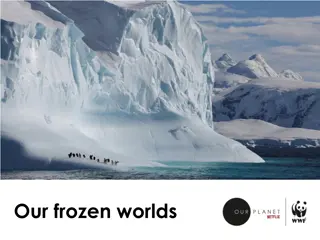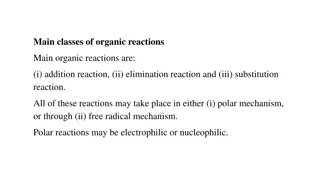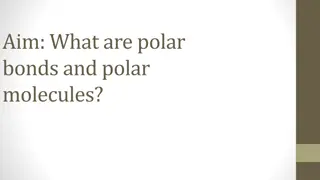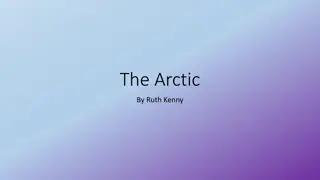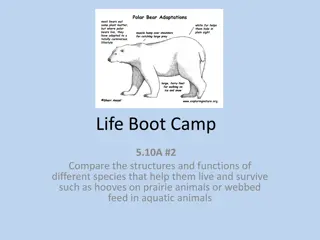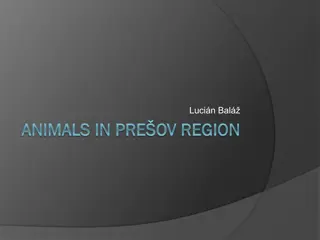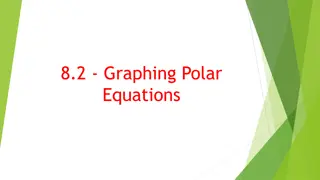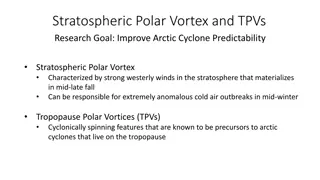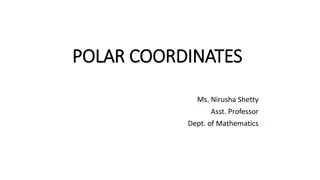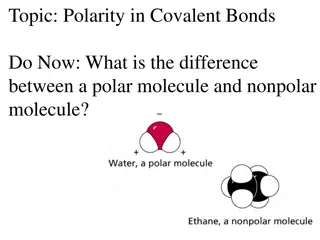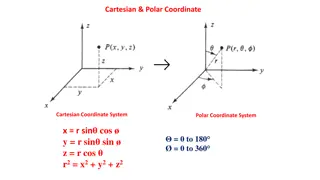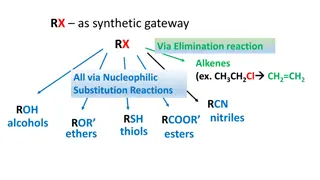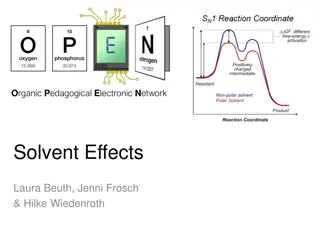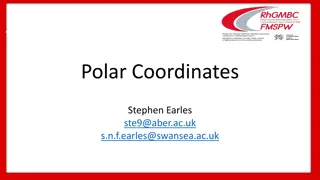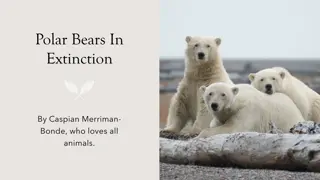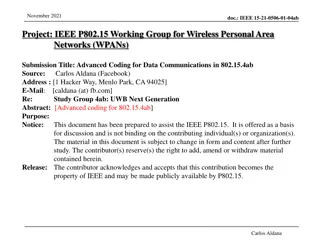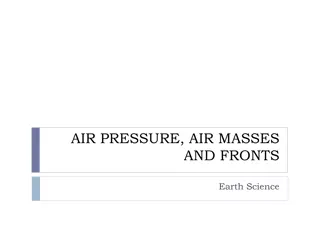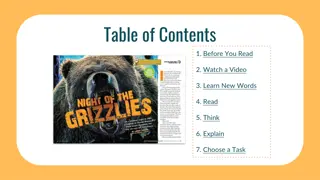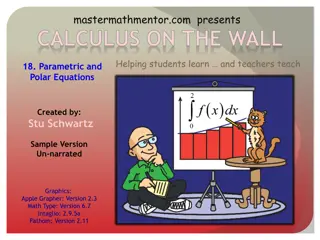Understanding Map Projections: Types and Applications
Map projection is a systematic transformation of latitudes and longitudes from a curved surface to a flat plane. There are various classifications based on construction methods, tangent surface position, view point of light, and qualities like equal area and equi-distance. Zenithal Polar Equidistanc
0 views • 9 slides
Introduction to Animal Habitats: Understanding how Animals Adapt to Their Environments
Explore the fascinating world of animal habitats with this educational session designed for children aged 8-9. Parents are encouraged to support their child's learning by delving into the concept of habitats, the adaptations of animals, and the conditions that influence their survival. From Arctic d
0 views • 9 slides
Fun Esti-Mystery: How Many Bears Are in the Glass?
Dive into the entertaining Esti-Mystery challenge of determining how many bears are in the glass by logically analyzing clues including numbers and colors. From estimating to final revelation, engage your number sense skills to arrive at the correct answer of 29 bears. Exciting and engaging activity
0 views • 6 slides
Impact of Climate Change on Arctic and Antarctic Regions
Explore the consequences of global warming on our frozen worlds in the Arctic and Antarctica. Learn about the critical role of sea ice, the effects on wildlife like walruses and polar bears, and how changes in the polar jet stream are causing extreme weather events. Discover ways we can combat clima
0 views • 9 slides
Understanding Membrane Proteins and Cell Membrane Permeability
Cell membranes consist of phospholipid bilayers with embedded proteins, including integral and peripheral proteins. Integral proteins span the membrane, while peripheral proteins interact with the surface. Only non-polar molecules can pass through the membrane directly, while charged ions, polar mol
0 views • 30 slides
Overview of Organic Reactions and Mechanisms
Organic reactions can be categorized into addition, elimination, and substitution reactions, occurring through either polar or free radical mechanisms. Polar reactions may be electrophilic or nucleophilic, while free radical reactions involve radicals reacting to complete electron octets. Different
2 views • 26 slides
Exploring the Fascinating Tundra Biome: A Comprehensive Guide
Delve into the unique ecosystem of the tundra biome near the Arctic Circle, characterized by extreme cold, limited plant life, and diverse animal adaptations. Discover the beauty of this harsh yet resilient environment, where animals like polar bears and penguins thrive amidst challenging conditions
2 views • 11 slides
Understanding Lipoproteins: Structures and Functions
Lipoproteins are compound lipids formed by the aggregation of neutral and amphipathic lipids with proteins (apoproteins). They serve as vehicles for transporting lipids through the bloodstream and lymphatic system, acquiring polarity due to their hydrophilic properties. These macromolecules are synt
0 views • 51 slides
Amino Acid: Structure and Classification Overview
Amino acids are essential building blocks of proteins, with only 20 out of the 300 occurring in nature being used for protein synthesis. The structure of amino acids consists of four groups attached to a central carbon atom. At physiological pH, these groups can ionize, forming zwitterions. Amino ac
0 views • 24 slides
Understanding Polar Bonds and Molecules in Chemistry
Learn about polar and nonpolar covalent bonds, the classification of bonds based on electronegativity differences, and how to identify polar molecules through unequal sharing of electrons. Practice determining bond types and grasp the concept of partial charges in polar bonds.
0 views • 18 slides
Understanding Soft Gamma-Ray Emissions from Pulsar Polar Caps
Soft gamma-ray emissions from the polar cap cascade region are a subject of interest in astrophysics, with studies focusing on the fundamental physical processes of pulsars and potential origins of non-thermal X-ray emissions. Researchers explore the emission processes, polar cap accelerators, casca
0 views • 16 slides
Discovering the Arctic: A Wintery Wonderland
The Arctic, located in the northernmost part of our planet, is a captivating region comprising the Arctic Ocean and territories of various countries. Home to unique wildlife like polar bears, snowy owls, and Narwhals, the Arctic also houses indigenous communities such as the Inuits. Learn about iglo
2 views • 7 slides
Arctic Habitat and Polar Bears: A Conservation Perspective
The Arctic habitat, home to diverse plants and animals like polar bears, faces threats such as climate change, toxic pollution, and oil exploration. Despite past population growth, polar bear numbers are now estimated to be between 22,000 to 31,000. Conservation efforts by Scandinavian countries hav
1 views • 6 slides
Conservation and Climate Change: Impact on Polar Bears
Learn about the real conditions and future possibilities of climate change on the Arctic, focusing on polar bears and their habitat. Understand how human actions, such as controlling pollution, can make a difference in protecting endangered species like polar bears from extinction due to the melting
1 views • 11 slides
Interactive Math Activity - Estimate the Number of Bears
Explore a fun and engaging math activity where you must estimate the number of bears in a glass by using given clues to narrow down possibilities. Choose from different slide sets for classroom or distance learning settings. Enhance estimation skills and critical thinking through this interactive se
0 views • 19 slides
Comparative Structures and Functions in Different Species
Explore how various species' physical adaptations, such as hooves and webs, aid in their survival. Understand the key roles of specific plant parts like stems and sunflower sections. Discover how specialized structures in animals like deer and polar bears contribute to their survival strategies.
0 views • 101 slides
Understanding Solubility: Applications and Experiments
Solubility plays a crucial role in various applications such as cleaning, separation, and identification. This content explores how solubility works with practical examples using magnets and marbles to illustrate the concept. Discover the differences between polar and non-polar compounds through han
0 views • 40 slides
Celebrating International Left Handers Day - Unveiling Left-Handers Facts and Trivia
International Left Handers Day on August 13th celebrates the uniqueness of left-handed individuals. Discover interesting facts like famous left-handed personalities, the prevalence of left-handers in the world, and surprising trivia about polar bears and kangaroos being left-handed. Explore visual c
0 views • 8 slides
Wildlife of Slovakia: Bears, Wolves, Eagles, and More
Explore the diverse wildlife of Slovakia featuring brown bears, grey wolves, golden eagles, pheasants, and ravens. Learn about these fascinating animals, their habitats, characteristics, and unique behaviors. Discover the beauty and richness of the animal kingdom in Slovakia through a collection of
0 views • 7 slides
Graphing Polar Equations: Examples and Symmetry Tests
Explore examples of graphing polar equations like r = 3, r = 4sin(θ), and more. Learn how to identify and graph such equations, along with tests for symmetry in polar graphs. Understand the relationship between polar axis, lines, and the pole in polar coordinate systems.
0 views • 15 slides
Research on Stratospheric Polar Vortex and TPVs for Arctic Cyclone Predictability
This research aims to enhance predictability of Arctic cyclones by studying the Stratospheric Polar Vortex and Tropopause Polar Vortices (TPVs). The presence of strong westerly winds in the stratosphere during fall leads to anomalous cold air outbreaks in mid-winter. TPVs serve as precursors to arct
0 views • 4 slides
Understanding Polar Coordinates in Mathematics
Polar coordinates define the location of a point in terms of distance and angle from an origin. The distance is denoted by "r" and the angle by "?". However, the angle is not unique for a point. The concept involves fixing an origin and an initial ray, with positive angles measured counterclockwise.
0 views • 7 slides
Understanding Polar Coordinates in Mathematics
Polar coordinates provide an alternative way to plot points using a directed angle and distance from the origin. This system involves radius (distance) and angle measurements, allowing for multiple representations of points. Graphing polar coordinates, converting between polar and rectangular coordi
0 views • 19 slides
Line Encoding Lab 6 - 2019/1440: Polar NRZ-L, RZ, and MAN Techniques with Decoder
Explore the Line Encoding Lab 6 from 2019/1440, featuring Polar NRZ-L, RZ, and MAN techniques with decoders. Dive into Simulink settings and output results for each encoding method. Discover how to modify binary number generators and pulse generators to enhance encoding. Conclude with a thank you me
0 views • 14 slides
Understanding Polarity in Covalent Bonds
The difference between a polar molecule and a nonpolar molecule lies in the distribution of electrons. A polar molecule has an asymmetric electron distribution due to a significant difference in electronegativity, while a nonpolar molecule has a symmetric electron distribution. You can predict polar
0 views • 15 slides
Polar Curves: Intersections, Areas, and Calculating Enclosed Areas
Explore polar curves, their intersections, areas enclosed by curves, and calculating enclosed areas using given equations. Learn to sketch graphs, find points of intersection, polar coordinates, and apply formulas for finding enclosed areas with examples provided.
0 views • 21 slides
Understanding Cartesian and Polar Coordinate Systems
Explore the concepts of Cartesian and Polar coordinate systems, including their formulas and visual representations. Dive into the relationships between Cartesian and Polar coordinates, as well as their applications in mathematics and physics. Discover orbital shapes such as Px, Py, Pz, and dz2 orbi
0 views • 12 slides
Setting Up Polar Heart Rate Monitors for School Fitness Tracking
In Sun West schools, every classroom is equipped with Polar heart rate monitors for tracking student activity. By setting up Polar Beat, Flow, and Coach accounts, teachers can remotely monitor and analyze student workouts. This guide covers creating Polar Flow and Coach accounts, syncing student acc
0 views • 10 slides
Understanding Polar Plots in System Analysis
The polar plot of a sinusoidal transfer function G(jω) represents the magnitude and phase angle of G(jω) on polar coordinates as ω varies from zero to infinity. It provides valuable insights into the frequency response characteristics of a system in a single plot. By following specific steps, you
0 views • 56 slides
Nucleophilic Substitution Reactions: Factors Affecting SN2 Reactivity
Understanding the factors influencing SN2 reactions in synthetic gateways involving elimination reactions of alkenes is crucial for predicting reaction rates. This includes analyzing the impact of solvent types on reaction rates in different scenarios. Polar protic solvents and polar aprotic solvent
0 views • 19 slides
Understanding Solvent Effects in Organic Chemistry
Different solvents can have varying effects on chemical reactions by influencing solubility, stability, and reaction rates. Solvents can control the pathway towards forming either thermodynamic or kinetic products based on their selection. Solutes dissolve based on intermolecular interactions with s
0 views • 6 slides
Introduction to Polar Coordinates: A Different Coordinate System
Exploring the concept of polar coordinates, a coordinate system introduced in the mid-seventeenth century by notable mathematicians independently. Learn about measuring angles in radians, converting between degrees and radians, and drawing graphs in polar coordinates by considering length and angle
0 views • 34 slides
Saving the Polar Bears: A Call to Action
Learn about the plight of polar bears facing extinction due to climate change and human activities. Explore ways to help save these majestic creatures by reducing greenhouse gases, switching to electricity, and stopping environmental pollution.
0 views • 6 slides
Advanced Coding Techniques for Wireless Personal Area Networks - IEEE 802.15.4ab
This document discusses advanced coding techniques proposed for IEEE 802.15.4ab to enhance data communication in wireless personal area networks. The focus is on interference mitigation, coexistence improvement, link budget enhancement, additional channels, and operating frequencies for improved rel
0 views • 22 slides
Development of Female Gamete and Embryo Sac in Plant Reproduction
In plant reproduction, the formation of female gametes involves meiosis in cells of the carpel sac, leading to the development of the embryo sac or megaspore. Meiosis results in four haploid cells, of which three degenerate, and one survives. This surviving cell undergoes multiple rounds of mitosis,
0 views • 7 slides
Understanding Dangers to Animals: Predators and Habitat Loss
Animals face various dangers in their natural habitats, including predators and habitat loss. Predators like owls, bobcats, and racoons hunt other animals, while habitat loss, such as the melting Arctic ice cap, threatens species like polar bears. Human activities, like beach development, also impac
0 views • 19 slides
Understanding Air Pressure, Air Masses, and Fronts in Earth Science
Explore the concepts of air pressure, air masses, and fronts in Earth Science. Learn about the influence of high and low-pressure systems, isotherms, pressure centers, global winds, the Coriolis Effect, and how air masses like continental and maritime affect weather patterns. Discover the impact of
0 views • 24 slides
Creating EP and Music Video for The Square Bears: A Production Project
Embark on a creative journey with The Square Bears, a funk band from Lincoln College, as you dive into producing a 4/5-track EP, alongside a captivating music video and album artwork. Explore the dynamics of EP production and music video creation while delving deep into the band's unique style and i
0 views • 10 slides
Exploring the Impact of Human Interaction on Grizzly Bears
Delve into the repercussions of human behavior on wild grizzly bears through a comprehensive journey from their historical depiction to present-day conservation efforts. The article prompts readers to question whether providing human food to wild animals is beneficial or detrimental, while also narr
0 views • 12 slides
Exploring Parametric and Polar Equations in Calculus
Dive into the world of parametric and polar equations with insights on graphing, tangents, conversions between polar and rectangular coordinates, and finding the area enclosed by polar curves. Discover the power of these mathematical representations in understanding complex curves and functions.
0 views • 6 slides
